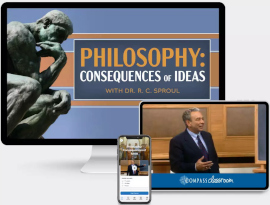Philosophy: Consequences of Ideas is an online course that uses Dr. R.C. Sproul’s The Consequences of Ideas video series (originally produced by Ligonier Ministries) along with online readings that draw from primary sources and readings from John Frame’s History of Western Philosophy and Theology (which you need to purchase separately from Amazon or another source). This is foremost a worldview course taught through the lens of philosophy. In fact, Frame says in the preface to his book, “My whole idea is to expose the fact that the history of philosophy and theology is nothing less than spiritual warfare in the life of the mind.” Note that both Sproul (deceased) and Frame are Reformed Protestants, and this religious perspective comes through strongly in their teaching.
Because the subject matter and the work are both challenging, this half-credit course is best for students in eleventh and twelfth grade. Students write many papers for the course, and you might also grant credit for composition work based on them.
The course is divided into five sections with a total of 16 lessons, each of which should take a week or more to complete. The first section, the introduction, requires much less time than the other four, but it still includes reading the first chapter of Frame’s book. The other four sections are titled Greek Philosophy, Medieval Christian Philosophy, Early Modern Philosophy, and Modern Philosophy. Both Sproul and Frame are selective about the philosophers they cover since they choose those who best illustrate the points they want to make.
Each lesson is divided into six to ten “steps,” and the time required to complete them will vary. The first step in each lesson is to watch one of Dr. Sproul’s video lectures. Sproul draws on biographical and historical backgrounds as he presents the ideas of major philosophers. His goal is to demonstrate how their ideas influenced the world and often continue to do so to this day. In 35 presentations (averaging 23 minutes run time), Sproul teaches about classical philosophers, such as Aristotle and Plato, Christian philosophers, such as Augustine and Aquinas, and Atheist philosophers, such as Marx and Hegel. Stories, anecdotes, and examples enliven presentations. The videos were professionally filmed on a classroom set with an audience. Sproul moves around constantly and uses a chalkboard from time to time. (For those who prefer to read, transcripts are included for each video.) Students might be assigned two or three videos for some lessons.
Reading assignments are interspersed as steps between the videos. Students will read from one or more PDF books and articles either about or by the philosophers plus one or two readings from Frame’s book, where he analyzes the philosopher and his ideas from a Christian worldview. For each lesson, students are to write a one- or two-page paper on a specified topic such as in this assignment for the first lesson: “Choose a philosopher from Diogenes’s Lives of the Eminent Philosophers and summarize what he says about the philosopher’s life.” (This book is also included in the course.)
All lessons include a review that summarizes key points and an online quiz. Some quiz questions require lengthier, unpredictable answers, so they need to be evaluated by a teacher or parent. Students can use their notes and books as they take quizzes since the goal is to learn rather than just get a high score. The amount of writing required on the quizzes is significant, and students can start and stop if they need to work on a quiz over more than one session.
Philosophy Journal
Students are to take notes throughout the course and write down questions that occur to them, ideally in a handwritten Philosophy Journal (created in a lined composition notebook). Typing on a device is allowed, but handwritten notes are preferable.
Reading Material
The dozen or so PDF books and articles used by the course were all published in the early 20th century and are written in modern English. They include books such as Brief Readings in Philosophy by Milo McDonald, which includes McDonald’s comments and his own selected excerpts from philosophical writers. They also include articles, such as Bertrand Russell’s “Why I Am Not a Christian.” Most reading assignments from books are selected pages rather than entire books. Students have access to the entirety of each book, and they might use them as sources for their writing assignments.
Readings from Frame’s A History of Western Philosophy and Theology (2015) are a substantial part of the course. The book is not especially difficult to read, but its 13 chapters often run about 50 pages. The course has links to previews of Frame’s book that allow students to read through the first chapter. The book includes a list correlating Frame’s recorded classroom lectures with chapters of his book; these lectures are available for free through iTunes. They are not part of this course, but students might find them helpful.
Some lessons include a “Go Deeper” assignment, a reading or video that provides more background. As the course creator says, “These… will provide additional historical and biographical context that Sproul and Frame sometimes ignore. I find that this perspective is useful in understanding a philosopher.”
Summary
Philosophy: Consequences of Ideas is an excellent though academically challenging course, and the online format is very convenient and easy to use.









